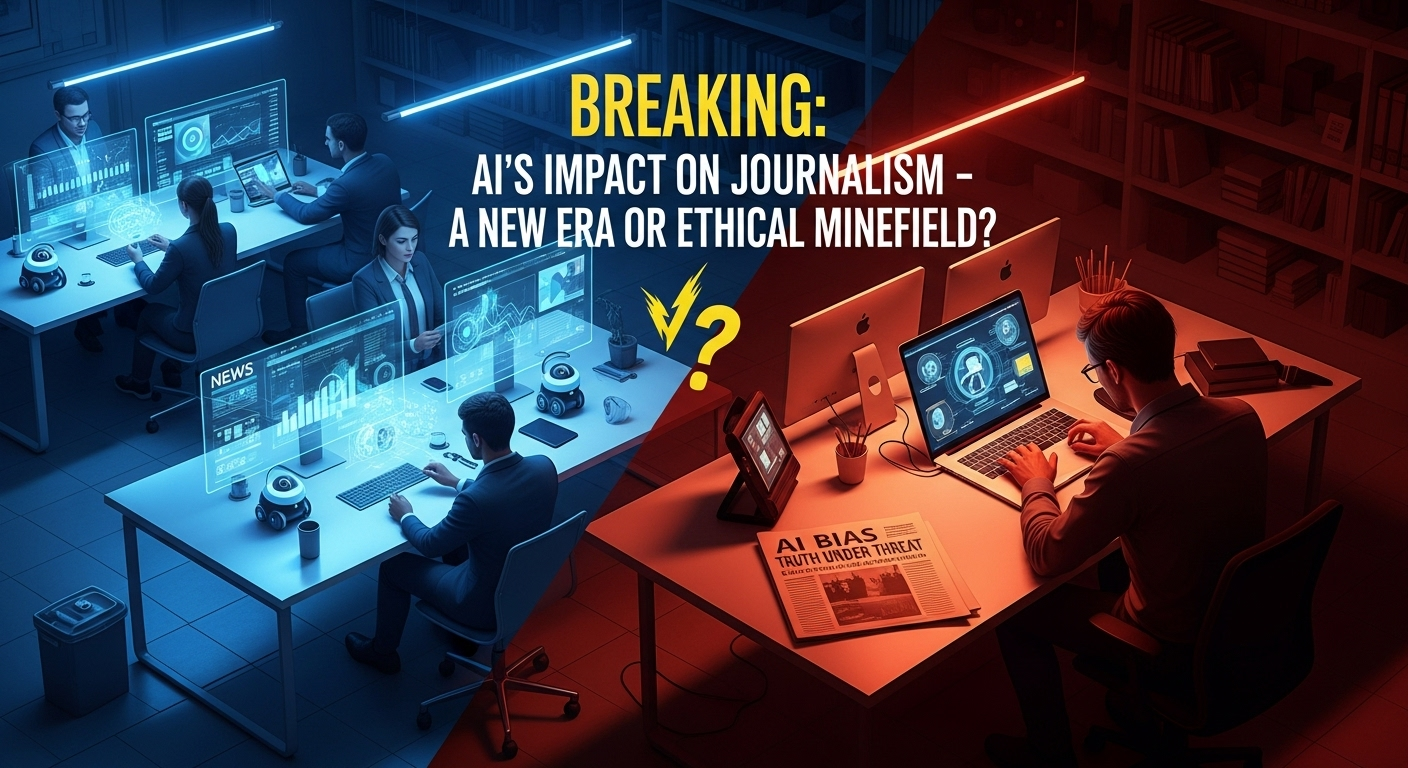Okay, let’s be real. The buzz around AI is… well, it’s a lot. Self-driving cars, art generators that can mimic Van Gogh, and now, AI writing news articles? I remember reading William Gibson’s “Neuromancer” back in college and thinking, “Cyberpunk is cool, but it’ll never really happen.” I might have been wrong. The question isn’t if AI will change journalism, but how much – and whether we can steer it away from the potential ethical iceberg that’s looming in the distance. So, is it a new era or an ethical minefield? Honestly, it’s probably a bit of both.
I initially thought AI in journalism was all doom and gloom – robots stealing jobs, the end of human creativity. But after digging into it a bit more, and talking with some colleagues actually using these tools, I’ve softened my stance. Slightly. The thing is, AI can be incredibly useful for automating some of the more tedious aspects of journalism. Think data analysis, sifting through mountains of information, or even just generating basic reports on things like sports scores or stock prices. Discover multiplayer games here!
And that, in theory, frees up human journalists to focus on the stuff that really matters: investigative reporting, in-depth analysis, and telling stories with actual nuance and empathy. You know, the stuff a machine just can’t (yet?) do.
The Speed vs. Accuracy Conundrum

Here’s where things get a little trickier. One of the big promises of AI is speed. News organizations are under constant pressure to be the first to break a story. And AI can definitely help with that. But at what cost? Speed without accuracy is just… noise. And in an era already drowning in misinformation, the last thing we need is more unverified “facts” spewed out by algorithms.
Think about it this way: a human journalist might spend hours (or even days) verifying a single source. An AI, on the other hand, might simply scrape information from the web and present it as truth, without any real understanding of context or credibility. I keep coming back to this point because it’s crucial. The algorithms are only as good as the data they’re trained on. If that data is biased or inaccurate, the AI will simply amplify those flaws. And that’s how we end up with AI perpetuating harmful stereotypes or spreading outright lies.
Bias in the Machine: A Serious Concern
Bias is another huge ethical challenge. AI algorithms are trained on data created by humans, and humans, well, we’re full of biases – conscious and unconscious. So, if the data used to train an AI reflects those biases, the AI will inevitably perpetuate them. This is especially problematic in journalism, where objectivity is supposed to be the guiding principle.
I read an interesting piece the other day about how AI-powered facial recognition software is much less accurate at identifying people of color. Now, imagine using that same technology to identify suspects in a crime report. The potential for bias is staggering. And that’s just one example. We need to be incredibly careful about how we use AI in journalism, and make sure we’re actively working to mitigate these biases. Actually, that’s not quite right – we need to be proactive in preventing these biases from ever creeping in.
The Future of Journalism: Collaboration, Not Replacement
I don’t believe AI will completely replace human journalists. At least, not anytime soon. What I do think is that we’re moving towards a future of collaboration. A future where AI handles the more mundane tasks, freeing up humans to focus on the creative, analytical, and ethical aspects of journalism. Here’s the thing, though: that future is only possible if we address the ethical challenges head-on.
We need to develop clear ethical guidelines for the use of AI in journalism. We need to ensure transparency, so readers know when they’re reading content generated by AI. And we need to invest in training journalists to work with AI, not against it. The rise of AI-generated news demands a thoughtful and ethical response.
And because this is a brave new world, the solutions aren’t always clear-cut. One thing’s for sure: we can’t just sit back and let AI run wild. We need to be actively involved in shaping its development and use, to ensure that it serves the public interest, not just the bottom line. You might be wondering how to do that. Well, that’s the million-dollar question, isn’t it?
Breaking: AI’s Impact – Ethical Considerations in Action
Let me try to explain this more clearly… The ethical considerations aren’t just abstract concepts. They have real-world consequences. For example, imagine an AI writing a news report about a political candidate. If the AI is trained on biased data, it might present a skewed or inaccurate picture of the candidate, potentially influencing the outcome of an election. Or imagine an AI writing a report about a local business. If the AI makes a mistake, it could damage the business’s reputation and even lead to financial ruin. These are high stakes, and we need to treat them accordingly.
I initially thought we could simply “fix” the algorithms and everything would be fine. I was wrong. The problem isn’t just the technology itself, but also the human biases that are embedded within it. And that’s a much harder problem to solve. But it can be solved. It requires a concerted effort from journalists, technologists, policymakers, and the public at large. We need to have open and honest conversations about the ethical implications of AI. And we need to be willing to make tough choices, even if they’re not always the most profitable ones.
By the way, did you know that AWS brings to data centers in Australia. That’s kind of neat, right?
FAQ: Your Burning Questions Answered
How do I know if the news I’m reading was written by AI?
That’s a great question, and honestly, it’s getting harder to tell! Ideally, news organizations should be transparent about their use of AI. Look for disclosures or disclaimers on articles. However, not everyone is playing by the rules. Pay attention to the writing style. Does it sound overly generic or repetitive? Does it lack the nuance and insight you’d expect from a human journalist? Those can be red flags. Also, be wary of articles that seem too good to be true – overly sensational headlines or claims that are not backed up by evidence.
Why is everyone so worried about AI bias in journalism?
Because news shapes our understanding of the world. If AI systems are biased, they can perpetuate harmful stereotypes and misinformation. Imagine an AI that consistently associates certain ethnic groups with crime. That could have devastating consequences for those communities. Objectivity is the cornerstone of good journalism, and bias undermines that entirely.
What can I do to be a more responsible news consumer in the age of AI?
Critical thinking is key! Don’t just blindly accept everything you read online. Seek out multiple sources of information. Check the credibility of the source. Look for evidence of bias. And be skeptical of anything that seems too good to be true. Also, support quality journalism! Subscribe to reputable news organizations and hold them accountable for ethical reporting.
Breaking: AI’s Impact – Is AI going to take all the journalism jobs?
While some jobs may be automated, it’s unlikely AI will completely replace journalists. The real impact of AI on journalism will be to augment and enhance human capabilities. In what is a new era or ethical minefield, there will be new job roles as well! AI can handle data analysis and fact-checking, freeing up journalists to focus on investigative reporting, in-depth analysis, and storytelling.
Ultimately, AI’s impact on journalism will depend on the choices we make today. We can choose to embrace AI responsibly, using it to enhance our reporting and serve the public interest. Or we can choose to let it run wild, potentially undermining the very foundations of our democracy. The choice is ours.



